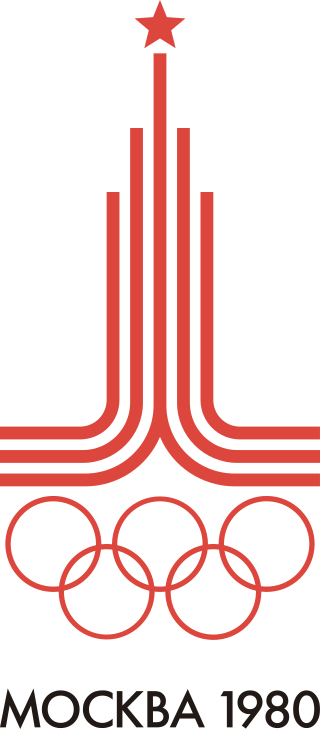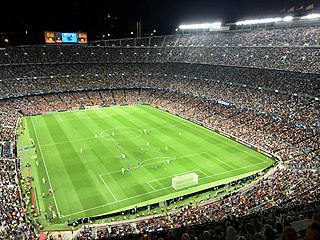Related Research Articles

The 1980 Summer Olympics, officially known as the Games of the XXII Olympiad and officially branded as Moscow 1980, were an international multi-sport event held from 19 July to 3 August 1980 in Moscow, Soviet Union, in present-day Russia. The games were the first to be staged in an Eastern Bloc country, as well as the first Olympic Games and only Summer Olympics to be held in a Slavic language-speaking country. They were also the only Summer Olympic Games to be held in a self-proclaimed communist country until the 2008 Summer Olympics held in China. These were the final Olympic Games under the IOC Presidency of Michael Morris, 3rd Baron Killanin before he was succeeded by Juan Antonio Samaranch shortly afterward.

FC Dinamo Tbilisi is a Georgian professional football club based in Tbilisi that competes in the Erovnuli Liga, the top flight of Georgian football.

Professional Football Club CSKA, commonly referred to as CSKA Moscow or CSKA Moskva outside of Russia, or simply as CSKA, is a Russian professional football club. It is based in Moscow, playing its home matches at the 30,000-capacity VEB Arena. It plays in red and blue colours, with various plain and striped patterns having been used.

Football Club Dynamo Kyiv, also known as FC Dynamo Kiev, Dynamo Kyiv, Dynamo Kiev, or simply Dynamo, is a Ukrainian professional football club based in Kyiv. Founded in 1927 as a Kyivan football team of republican branch of the bigger Soviet Dynamo Sports Society, the club as a separate business entity was officially formed only in 1989 and currently plays in the Ukrainian Premier League, and has never been relegated to a lower division. The club has secured brand rights from the Ukrainian Dynamo society and has no direct relations to the sports society since 1989. Their home is the 70,050 capacity Olimpiyskiy National Sports Complex.

Association football is the most popular sport in Russia, surpassing ice hockey by a wide margin. Men's football is overseen by the Russian Football Union, having the Russian Premier League as the first tier of the Russian football league system, with the Russian Football National League being the second tier.

FC Spartak Moscow is a Russian professional football club based in Moscow. Having won 12 Soviet championships and 10 Russian championships, it is the country's most successful club. They have also won a record 10 Soviet Cups, 4 Russian Cups and one Russian Super Cup. Spartak have also reached the semi-finals of UEFA Europa League, UEFA Champions League and the UEFA Cup Winner's Cup.

The Russian Premier League, also written as Russian Premier Liga, is the top division professional association football league in Russia. It was established at the end of 2001 as the Russian Football Premier League and was rebranded with its current name in 2018. From 1992 through 2001, the top level of the Russian football league system was the Russian Football Championship.

The European Handball Federation (EHF) is the umbrella organisation for European handball. Founded on 17 November 1991, it is made of 50 member federations and two associated federations, and is headquartered in Vienna, Austria.
The FIBA Women's Basketball World Cup, also known as the Basketball World Cup for Women or simply the FIBA Women's World Cup, is an international basketball tournament for women's national teams held quadrennially. It was created by the International Basketball Federation (FIBA). Its inaugural game was in 1953 in Chile, three years after the first men's World Championship. For most of its early history, it was not held in the same year as the men's championship, and was not granted a consistent quadrennial cycle until 1967. After the 1983 event, FIBA changed the scheduling so that the women's tournament would be held in even-numbered non-Olympic years, a change that had come to the men's tournament in 1970.
The Russia women's national handball team is the national team of the Russian Federation. It is governed by the Handball Federation of Russia and takes part in international handball competitions.

Sport in Europe tends to be highly organized with many sports having professional leagues. The origins of many of the world's most popular sports today lie in the codification of many traditional games, especially in the United Kingdom. However, a paradoxical feature of European sport is the extent to which local, regional and national variations continue to exist, and even in some instances to predominate.

The most popular sport in Russia is soccer. According to Yandex search analysis results rating of the most popular sports among Russians: "Football topped the list of the most popular sports in Russia" with 5 to 10 million requests. Ice hockey came in second with handball, basketball, futsal, boxing, auto racing, volleyball, athletics, tennis, and chess rounding out the top ten rankings. Other popular sports include bandy, biathlon, figure skating, weightlifting, gymnastics, wrestling, martial arts, rugby union, and skiing.

The Soviet Hockey Championship was the highest level ice hockey league in the Soviet Union, running from 1946 to 1992. Before the 1940s the game of ice hockey was not cultivated in Russia, instead the more popular form of hockey was bandy. Following the dissolution of the USSR, the league was temporarily renamed the CIS Championship in 1992. This organization was the direct predecessor of the International Hockey League, and subsequent Russian Superleague (RSL) and current Kontinental Hockey League (KHL).

The Handball Federation of Russia commonly known by its acronym, HFR, is the national governing body of handball in Russia. Is a public sports organization with its primary focus centered on the development and promotion of handball. RHF serves as the governing body responsible for organizing and overseeing handball competitions throughout Russia. Furthermore, it plays a crucial role in the management and coordination of the Russian national handball teams.
Vladimir Viktorovich Korotkov is a retired Soviet tennis player who won three Junior Grand Slam tournaments, Wimbledon Boys Singles in 1965, 1966 and the French Juniors in 1966. He also won the mixed doubles at the 1968 Summer Olympics where tennis was a "demonstration sport". He won the men's doubles event at the 1973 Summer Universiade and the 1977 USSR singles championship. From 1981 until his retirement in 1996, Korotkov was coaching at several sports clubs.
The Soviet Women's Handball Championship was the premier women's handball championship in the Soviet Union. Founded in 1962, it last took place in 1992 following the state's collapse.

KSK Luch Moscow is a Russian women's handball club from Moscow. Founded in 1959 as Trud Moscow, it took its current name in 1966.
The 1962–63 Women's Handball European Champions Cup was the third edition of the premier international competition for European women's handball clubs, taking place from November 1962 to April 1963. Fourteen teams took part in the competition, with Denmark, East Germany, Hungary, Netherlands and Sweden making its first appearance, so a first round was introduced. 1962 champion and runner-up Czechoslovakia and Yugoslavia were granted byes for the quarter-finals. For the first time the final was carried out as a single match, taking place in Prague on April 14.
The Soviet Union football league system was a series of interconnected leagues for men's association football clubs in the Soviet Union which included "teams of masters" from constituent union republics. The system has a hierarchical format with promotion and relegation between leagues at different levels, allowing even the smallest club the theoretical possibility of ultimately rising to the very top of the system. For most of its time, the all-union level had two tiers, while for a good portion of the Soviet period there existed a third tier, and for a much less period, a fourth.
Handball has a rich history in Russia, dating back to the early 20th century when the sport was introduced to the country by European immigrants. However, it wasn't until the 1950s that handball began to gain popularity in Russia.
References
- ↑ todor66.com Men Retrieved 14 April 2022
- ↑ LesSports.info Handball - Soviet Union - Division 1 Men - Winners] Retrieved 14 April 2022
- ↑ Места команд по годам + преемственность клубов Retrieved 14 April 2022